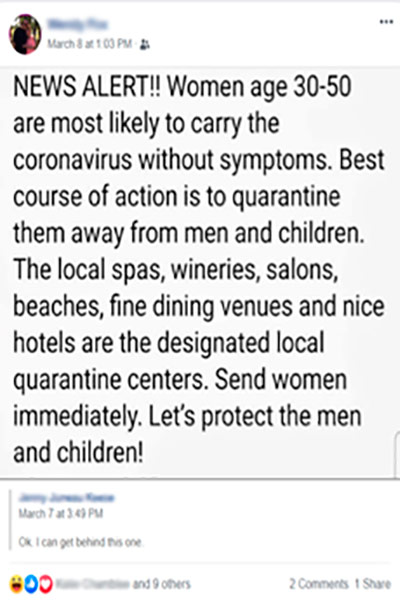-
Radio in the Time of Coronavirus
March 17, 2020
Have an opinion? Add your comment below. -
At the conclusion of Nobel prize winning author Gabriel Garcia Marquez’s 1985 novel “Love in the Time of Cholera” two lovers on a boat raise the yellow “cholera here” flag so that they are forever quarantined together. That is, they took advantage of the fear of cholera for their own purposes.
As public servants, for-profit enterprises, voices of our communities, and entertainment vehicles, what should radio stations do with or about coronavirus? Ignore it? Make fun of it? Repeat every rumor that comes around?
As always the answer is to a degree dependent on what kind of radio station you are. In general, though, you might think of the options as a spectrum that runs from hilarity on one pole to panic on the opposite, with “ignore” right in the middle.
Unless you want your radio station to be an absolutely escapist alternative to reality, ignoring coronavirus is not the answer; as appealing as it may sound right now, neither we nor our listeners live in a bubble.
At the extremes, there’s nothing hilarious about the pandemic, and frightening listeners hardly benefits them or you. But in the margins between ignore/comedy and ignore/panic is where we can serve our audiences by adding two more points on the spectrum: between ignore/panic is “serve”, and between ignore/comedy is “lighten up.”
For service, we can offer useful and credible information, such as:
- Tips for staying healthy (frequent handwashing, get plenty of sleep, exercise eat well etc.)
- Debunking rumors and misinformation
- And facts. What’s actually happening here? Do we have local cases? What happens when we do? Etc.
You might want to find a local medical professional to be your credible voice for delivering health information. You could sponsor the segment, but take care not to sound as though the information you’re bringing is just a shill to drive patients to a doctor or practice-–that’s likely to be counterproductive.
Should younger-targeted stations carry “information?” I think so. In my experience, younger listeners crave information when it’s important to them. For example, in the ‘90s Desert Storm was a big deal for young people, as their friends and family were being called up and sent to the Mideast. Many radio stations we worked with, such as B96 in Chicago, carried hourly updates and saw their ratings stay strong.
In between information and humor, there’s simple topicality, just reflecting and touching base on the issue. One way of course is to let your listeners talk. KLTA in Fargo found another; their morning show just added a new cast member who comes from the Seattle area…so they made him wear a mask during his first 14 days on the air. Not informational, not funny necessarily, but absolutely on-point.
As for helping the audience lighten up, let’s start with the question of whether it’s even appropriate for a radio station to make light of a deadly pandemic. I’d say that’s a flat “No” - but only because of the way the question is phrased. We don’t want to make light of the disease or of anyone who has it. But in times of stress humans always use humor as a coping mechanism, and we can definitely make fun of the dumbest rumors and silliest non-facts (it isn’t true that people stopped drinking Corona beer in fear, but if you get coronavirus twice, you do have Dos Equis).
Your audience right now may be more comfortable with coronavirus humor than you are. For example, this Facebook post:

The woman who re-posted this lives in a market with no confirmed cases so far. You’ll have to gauge your own market’s fear level as time goes on.
When and if you do try to lighten up the mood a bit, it may be helpful to tell the audience what your philosophy is, you know this is serious business and we’d never make fun of anyone who’s ill…but at the same time, humor helps people cope.
And I might suggest a rule of thumb, if you’re wondering if something might be in bad taste, it probably is.
Your thoughts and ideas? alan@burnsradio.com
-
-
